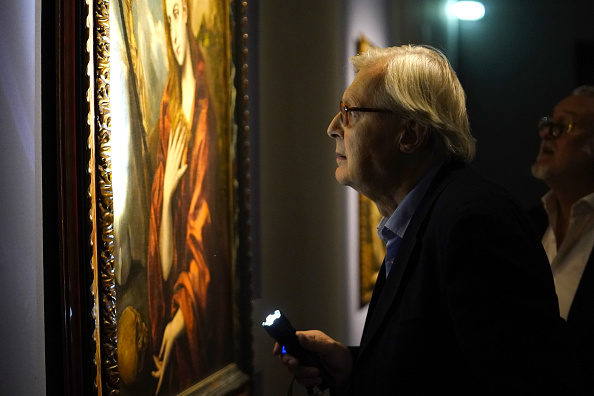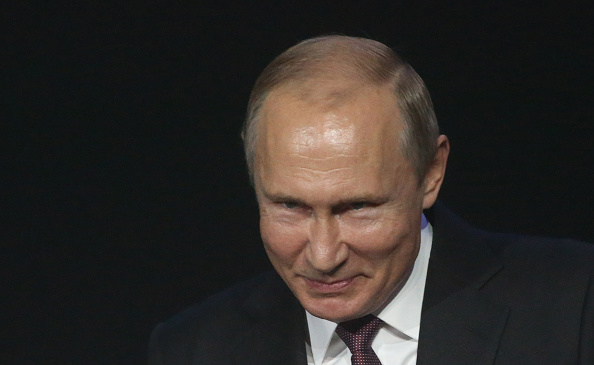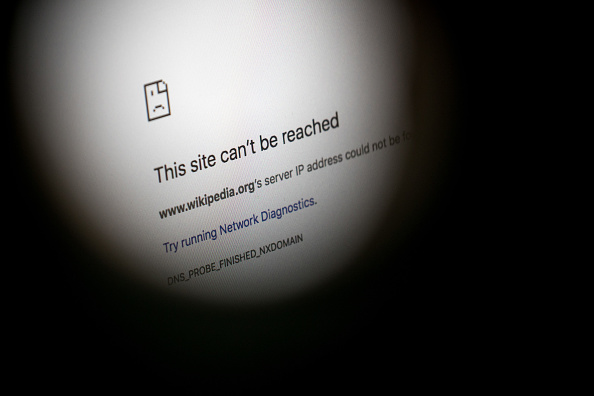The predicted rise of the European Conservatives and Reformists (ECR) appears likely to provide Commission President Ursula von der Leyen a tempting opportunity to form new alliances.
With support for the Brussels bigwig faltering amongst parts of the political left, von der Leyen has increasingly flirted with the possibility of making deals with the group in order to secure her second term in office.
In the next European Parliament, most of these ECR MEPs von der Leyen will be looking to court will be speaking Italian.
Fratelli d’Italia, led by Italian Prime Minister Giorgia Meloni, is hoping that a strong win in June will cement the party’s place as the country’s strongest party, and set up its MEPs as a sought-after bloc of votes for von der Leyen.
So far, they appear on course for such a win, with polls predicting that the ECR group member will land between 27 and 28 per cent of the vote, ahead of the predicted 20 per cent of centre-left outfit Partito Democratico, which is set to come in a distant second.
On issues such as support for Ukraine and NATO and accepting European Union fiscal rules, Meloni has been hugging the centre-right of late — likely judging that is where most new votes lie. Indeed, polls do suggest that, of her two coalition partners, the centre-right Forza Italia is doing better than Matteo Salvini’s populist Lega party.
“Interestingly, Forza Italia [at 10 per cent] was seen as surpassing Lega [7 per cent] for the first time in months, positioning itself as a more moderate force, as opposed to Matteo Salvini’s declining influence,” Portland Communications’s Gabriel Milland said on February 16.
Eurasia Group’s Mujtaba Rahman meanwhile noted that while Meloni champions more traditional conservative lines on family issues and irregular migration, on the whole, she has largely charted a moderate course in line with Italy’s previous PM Mario Draghi.
Meloni likely wants to coast from a strong performance in European Parliament elections to launch a referendum campaign to change the constitution. She believes Italy’s short-lived governments hold the economy back and wants Italy to have a directly elected PM who would serve a five-year term.
She has some justification here: Italy had nine prime ministers and 12 governments from 2002 to 2022, compared to four governments for France and three for Germany. In those years, Italy’s economy grew by 4 per cent, against 20 per cent for both France and Germany.
Italy’s Prime Minister Giorgia Meloni appears to be positioning herself as Trump’s interlocutor of choice in Europe and von der Leyen’s in Europe’s centre-right – as both aim for second terms. https://t.co/AYjN1HqCBz
— Brussels Signal (@brusselssignal) March 20, 2024
The promise of stronger leadership is a policy designed to win over right-of-centre voters who might otherwise be tempted to Fratelli’s coalition partners, Salvini’s Lega. It is also an inexpensive move — helpful for a country with the Eurozone’s second-highest public debt, relative to GDP (€2.85 trillion).
Problems for Fratelli include that, since taking power in October 2022, there has been an accumulation of perhaps inevitable minor scandals; a culture minister who likes his job too much and (allegedly) ended up with a stolen 17th Century painting and an MP who took a gun to a New Year’s party, with the firearm allegedly being used to accidentally shoot another party attendee who himself had distant links to the Meloni government.
Amid such troubles, Salvini’s Lega remains nipping at Meloni’s heels. The more right-wing, populist member of Meloni’s coalition the party topped the 2019 European Parliament elections, landing 29 seats.
Almost all of these MEPs will soon need to find other jobs, as polls project Lega will keep around eight or nine of those this time round
Salvini has been hitching his star to Marine Le Pen in France, with Lega being allied with her Rassemblement National in the EU’s populist Identity and Democracy bloc.
The two appeared together in Bergamo, Northeast of Milan, in September, where Le Pen praised Salvini’s record on migration as interior minister in 2018-9.
Perhaps interestingly, Salvini did not invite her successor, Jordan Bardella, who took over as RN’s President in 2022. This is despite the fact that, as the Frenchman’s name suggests, his father’s family is from Turin.
Salvini hopes to use his time as interior minister, where he kept NGO ships from docking in Italy, to lure electoral supporters from Meloni. There are votes to the Right going spare, he judges, as she moves more to the centre in an apparent bid to gobble up votes haemorrhaging from Forza Italia, left rudderless following the death of its leader, Silvio Berlusconi.
Still, Salvini has also recently been in court over precisely that time in office. And, while Meloni has been strongly pro-Ukraine, Salvini – especially after Russian opposition leader Alexei Navalny’s recent death – faces lingering criticisms that he is too close to Russian President Vladimir Putin.
“Despite the support for the government, 54 per cent saw the country to be on the wrong path,” noted Milland.
Meanwhile, on the centre-left, Elly Schlein’s Partito Democratico has 19 seats in the European Parliament for now.
Taking the reigns of her party in 2023, Schlein has been seen as a bastion of progressivism in an Italy turning further and further to the right, being compared to the US’s Alexandria Ocasio-Cortez and the UK’s Jeremy Corbyn.
She has also been heavily involved in international politics in the past, with the American citizen having previously campaigned twice for former President Barack Obama.
Such credentials do not appear likely to benefit her much in June, with current polling indicating that her party will lose between two and five of its MEPs after June as voters move to support more conservative politicians.
Italian Deputy Prime Minister and transport minister @MatteoSalviniMI is not amused with European Commissioner Margrethe Vestager’s objections to German airline Lufthansa’s entry into Italy, calling it “Euro-madness”. https://t.co/J1bgzu2uWl
— Brussels Signal (@brusselssignal) March 27, 2024





If mainstream German politics fragments further, would it help the CDU?